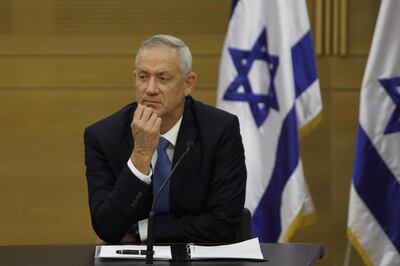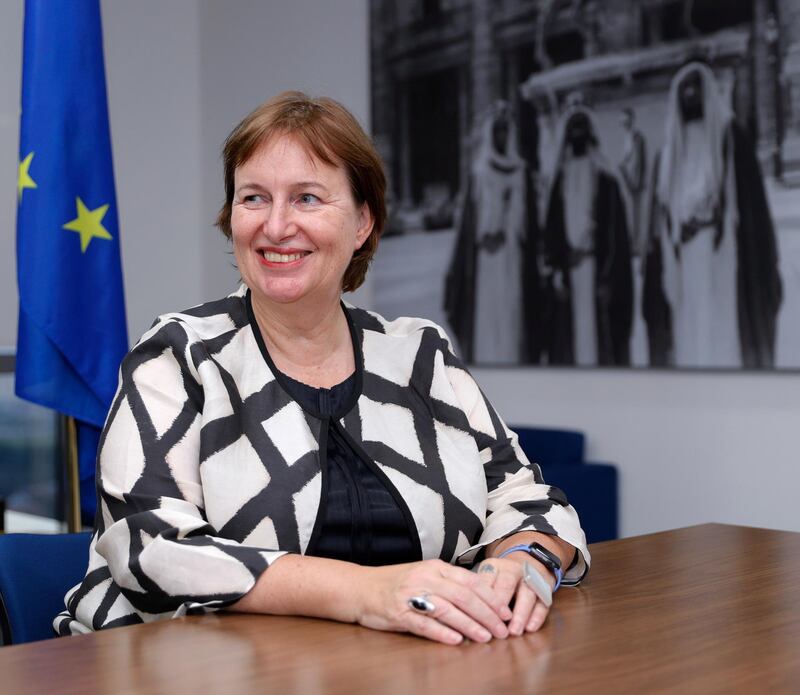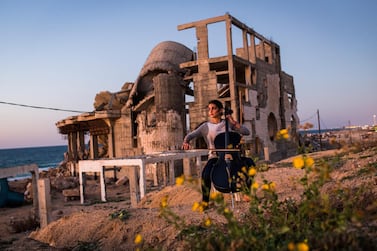A senior European official said the next Israeli prime minister may take less hardline positions on the conflict with the Palestinians.
Susanna Terstal, the European Union’s Special Representative for the Middle East Peace Process, cautioned against automatically assuming that if Benny Gantz becomes Israel’s next leader, he would stick to the same policies that have undermined a two-state solution as Benjamin Netanyahu.
“I do not think the policies of Blue and White are per se very different from Likud,” Ms Terstal told The National in an exclusive interview during a visit to Abu Dhabi.
“But different people bring different possibilities to the table and, of course, we hope a new government in Israel will bring renewed engagement on some of the very difficult topics.”
Mr Netanyahu and Mr Gantz campaigned in last month’s Israeli election on similar platforms, centred on keeping occupied territory and furthering Jewish settlements and annexation. The result separated the two by an ultra-slim margin in the 120-seat parliament.
Palestinian parties raised their share significantly but they are yet to take part in a ruling Israeli coalition.
On the campaign trail, differences between Mr Netanyahu and Mr Gantz were mainly on domestic issues.
Mr Gantz focused on what he regards as the need to impose justice on Mr Netanyahu, who faces corruption charges, to preserve Israeli democracy.
In her second year on the job, Ms Terstal, who is from the Netherlands, said she was under no illusions about the complex political picture in Israel and that “in the last few years we have seen increased settlement activity and more outposts and settlements being legalised by the Israeli government”.

Her mission is to “do everything possible to work on a solution with the Israeli government”.
President Reuven Rivlin last week gave Mr Gantz 28 days to put together an administration. It was the first time in more than 10 years someone other than Mr Netanyahu received such an invitation.
An inconclusive election in April led to another poll last month. If Mr Gantz also fails, Israel could be forced into a third ballot.
“There are a lot of possibilities on the table but they are all hard to attain,” Ms Terstal said of Mr Gantz’s chances.
She said dismissing Mr Gantz as no different from Mr Netanyahu “undermines the possibility of looking for ways forward on the two-state solution”. The prospect of two states, which United Nations Security Council Resolution 242 of 1974 called for, diminished not long after the inception of the peace process at secret talks in Norway in 1993.
Israel increasingly took unilateral action to skew the topography and demography of Palestine, in breach of the accords and against international law – most unequivocally under Mr Netanyahu.
The Palestinians, meanwhile, undermined themselves from within. Gaza rulers Hamas, backed by Iran and Qatar, as well as the Palestinian Authority in the West Bank have de facto reappointed themselves since the Palestinian civil war between 2006 and 2007.
“The Palestinians are in a difficult position and the division between the West Bank and Gaza is not only unfortunate but really something that has to be solved first and foremost by the Palestinians themselves,” Ms Terstal said.
An announcement by PA President Mahmoud Abbas last month of his intension to hold elections could plug “a large democratic deficit between the Palestinian leaders and their people”, she said, if the poll was agreed with Hamas and conducted across the occupied territories, including East Jerusalem.
Ms Terstal said democracy, coupled with the end of the Israeli occupation in a peace deal that guarantees security for the two sides, could rekindle hope among Palestinians, especially the young.
The EU is a large financial backer of the PA, despite the rampant corruption plaguing it and its crackdown on dissent.
The bloc, often divided on foreign policy, has tried without success to convince Israel to lift bans on EU-funded development projects in occupied territories.
Along with the US, Russia and the UN, the EU comprises the so-called Middle East Quartet formed in 2002 to settle the conflict.
A delayed US plan for peace led by Jared Kushner, President Donald Trump’s adviser and son-in-law, could at last be unveiled if a new Israeli government is formed.
In June, Mr Kushner organised an international conference in Bahrain to market an economic component of the plan.
The conference united the PA and Hamas in that they both ridiculed Mr Kushner for ignoring the reality of the Israeli occupation.
While representing the EU in Bahrain, Ms Terstal said she noticed that many of the potential development projects Mr Kushner touted were the EU’s brainchild, envisioned to help support the two-state solution by strengthening Palestinian government and the economy.
She said that despite Mr Kushner’s focus on business, he appears to realise that a working Palestinian economy cannot be realised without peace.
“Why would a businessman in any country invest when they are not sure their products or the things they need can come into Palestine?” Ms Terstal said. The US has not yet shared the political core of its peace plan with the EU, she said.






